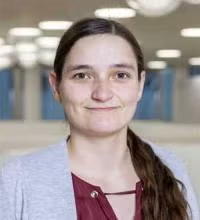Research Laboratory

Leadership
Jonathan Flint, MD
Professor
Billy and Audrey Wilder Endowed Chair in Psychiatry and Neuroscience
Contact Info
Flint Lab Website
635 Charles E Young Dr S
Neuroscience Research Building, RM 304D
Los Angeles, CA
(310) 206-7338
About
The Flint Lab studies the genetic basis of behavior and psychiatric disorders using mouse models and advanced genomic tools. It focuses on understanding how specific genes contribute to emotional and cognitive traits relevant to anxiety, depression, and substance use. The lab is part of the broader effort to bridge animal and human research in behavioral genetics. Dr. Jonathan Flint leads the lab and is a leading figure in international genetics consortia. The lab’s work aims to inform personalized medicine approaches for mental illness.
Team
-

Dr. Jonathan Flint
PI -

Dr. Patrick Chen
Adjunct Assistant Professor -

Sky Andrews
SRAI -

Dr. Anna-Sophia Hartke
Postdoc Researcher
Alumni
-

Rachel Chen
Lab Manager, SRA -

Anne Zhao
-

Ariel Wang
Projects
Developing a Pathway from Genetic Locus to Gene for Complex Traits in Rodents
An open question in neurobehavioral genetics involves both the identification and experimental validation of genomic regions and candidate genes associated with behavioral variation. Our lab is interested in developing a quick and efficient way to progress from genetic mapping to gene identification in rodent models of complex disease, especially genes involved in anxiety and depression. We fine-map anxiety-related QTLs (quantitative trait loci) by taking advantage of the genetic and behavioral variation between different mouse strains and identify QTLs containing a testable number of candidate genes for genetic engineering experiments. Using CRISPR/Cas9, we then make recessive knockouts of the candidate genes and test the behavior of these animals through a QTL interaction test to determine whether any of these predicted genes are involved in our anxiety phenotypes.
Identifying How Genetic Variation Affects Neural Circuit Function
Though hundreds of genomic loci have been found to affect complex behaviors and neuropsychiatric disorders in humans, a clear biological mechanism linking genetic variation to changes in molecules, cells, and circuits underlying behavioral variation has been difficult to establish. By using the available tools in rodent model systems, we can begin to identify the relationship between genetics and higher-order organization in the brain. Through circuit manipulations, imaging, and tracing, we are interested in 1) establishing the functional variation in cells and circuits of key brain regions in different mouse strains, and 2) genetically mapping circuit functions as a means to identify the mechanisms and precise locations in the brain where genetic variants are acting
Using Voice to Diagnose Depression
The deployment of objective assessments of psychiatric phenomenology would transform the ability to diagnose, treat and prevent major depressive disorder (MDD). MDD is very common, affecting almost one in ten people and recently recognized to be the world’s leading cause of disability. Yet currently only about half of those suffering MDD are detected and offered treatmen. One of the main obstacles preventing effective use of existing therapies is the difficulty of diagnosing MDD. Diagnosis is still made on the basis of a clinical interview and mental status examination, a method with relatively low reliability; screening instruments are hampered by poor specificity and sensitivity and no reliable biomarkers exist. Further complicating the problem, MDD remains a syndromal diagnosis, leaving open the possibility that it consists of a number of different conditions, each with different outcomes and treatment response.
A possible source of information for improving diagnosis, and recognizing subtypes, is characterization of MDD by a person’s voice. A cardinal symptom of depression is psychomotor retardation which is associated with changes in brain function, and vocal features, supporting the hypothesis that neurophysiological changes associated with mood are reflected in speech. However, despite considerable advances over more than 60 years, analysis of vocal features has not so far been clinically useful.
This project combines genomics with voice data and apples novel computational approaches to achieve automated recognition of MDD (thereby potentially alleviating MDD’s worst consequences, including suicide). We are using voice recordings acquired during a genetic association study of MDD to show that voice features are heritable and are genetically correlated with MDD. We are developing analyses that predict MDD from voice, and we use combined genetic and vocal features to identify MDD subtypes
Identifying the Genetic Causes of Depression in a Deeply Phenotyped Population from South Korea
This project will collect samples from 10,000 South Korean women with recurrent major depressive disorder and 10,000 matched controls. All subjects will be genotyped and the location of genetic risk factors identified in a genome-wide association analysis. The cohort will also provide detailed information about the likely environmental causes of depression, and when combined with a similarly deeply phenotyped cohort from China, will form a uniquely powerful resource for the discovery of genes involved in recurrent major depressive disorder.
Improving the Interpretability of Genetic Studies of Major Depressive Disorder To Identify Risk Genes
The research proposed here will contribute to an understanding of the causes major depressive disorder, the commonest psychiatric disorder and a leading cause of disability throughout the world. The proposal will improve our ability to diagnose depression from electronic health records, generate insights into the genetic architecture of depression, separating out specific from non-specific genetic risk factors, and will identify, from the analysis of sequencing data, genes that are involved in the etiology of the disorder. The research will provide new insights into disease, and well enable the development of more effective therapy.
Training
Postdoctoral Scholar Position
Jonathan Flint’s research group at UCLA leverages integrative mouse genetics to study the pathogenesis of
mood disorders. The group is looking for post-doctoral bioinformaticians and biostatisticians that would be able
to lead an exciting project on the genetic bases of anxiety. This project will identify genes that give insight into
a circuit-based understanding of anxiety. Anxiety is a common disorder for which we have relatively ineffective
treatments. The project is focused on the development and applications of novel analytical approaches for gene
identification in mammal. The team is very interdisciplinary with a focus on quantitative analysis, including
statistics, computer science, and mathematical modeling.
Combining novel strategies that the Flint laboratory has pioneered, including the use of outbred rodents for
high-resolution genetic mapping, catalogs of genetic variants in mouse strains from genome sequencing, and
methods for gene identification, an efficient and simple protocol will be deployed to progress quickly from locus
to gene identification. This project will likely lead to new discoveries related to anxiety, but the opportunities in
the lab are broader, and our goal is to make an impact on the field of complex traits in mammalian genetics
Applicants should have the following qualifications:
The position requires a Ph.D. in one of the following fields: computational biology, bioinformatics, biostatistics,
human genetics, genomics, computer science, statistics or mathematics. The individual should have a good
publication record and show a strong track record in genetics and genomics, as well as good analytical
background. The person should be highly motivated, independent, have good verbal and written
communication skills, and work well in a highly collaborative and interdisciplinary environment.
Contact
Applicants should e-mail their CV and references to Dr. Jonathan Flint jflint@mednet.ucla.edu
Collaborations
UCLA
Eran Halperin, PhD, Departments of Computer Science, Computational Medicine (Website)
Eleazar Eskin, PhD, Computer Science (Website)
Noah Zaitlen, PhD, Departments of Computational Medicine and Neurology (Website)
Nelson Freimer, PhD, Center for Neurobehavioral Genetics and Professor of Psychiatry (Website)
Sriram Sankararaman, PhD, Departments of Computer Science, Human Genetics, and Computational Medicine (Website)
Abeer Alwan, Samueli Electrical and Computer Engineering (Website)
External
Ken Kendler, MD. Virginia Commonwealth University (Website)
Abe Palmer, PhD, UCSD (Website)
Richard Mott, PhD, University College London, UK (Website)
Weidong Li, MD, PhD, Shanghai Jiao Tong University, China (Website)
Tingshao Zhu, PhD, Institute of Psychology, Chinese Academy of Science, China (Website)
Thomas Keane, European Bioinformatics Institute, UK (Website)
Andrew Dahl, PhD, University of Chicago (Website
Christopher Gignoux, PhD, University of Colorado Denver (Website)
Na Cai, PhD, Helmholtz Zentrum München, Germany (Website)
Andrew Schork, PhD, Region Hovedstaden, Denmark (Website)
Nancy Cox, PhD, Vanderbilt University (Website)
Yong Min Ahn, MD, PhD, Seoul National University Hospital, South Korea (Website)
Publications
2024
V. Ravi; J. Wang; J. Flint; A. Alwan “A Privacy-Preserving Unsupervised Speaker Disentanglement Method for Depression Detection from Speech.”
P.B. Chen; R. Chen; N. LaPierre; Z. Chen; J. Mefford; E. Marcus; M.G. Heffel; D.C. Soto; J. Ernst; C. Luo; J. Flint “Complementation testing identifies genes mediating effects at quantitative trait loci underlying fear-related behavior.”
V. Ravi; J. Wang; J. Flint; A. Alwan “Enhancing accuracy and privacy in speech-based depression detection through speaker disentanglement.”
Y. Di; J. Mefford; E. Rahmani; J. Wang; V. Ravi; A. Gorla; A. Alwan; T. Zhu; J. Flint “Genetic association analysis of human median voice pitch identifies a common locus for tonal and non-tonal languages.”
B. Balliu; C. Douglas; D. Seok; L. Shenhav; Y. Wu; D. Chatzopoulou; W. Kaiser; V. Chen; J. Kim; S. Deverasetty; I. Arnaudova; R. Gibbons; E. Congdon; M.G. Craske; N. Freimer; E. Halperin; S. Sankararaman; J. Flint “Personalized mood prediction from patterns of behavior collected with smartphones.”
2023
J. Flint; M.G. Heffel; Z. Chen; J. Mefford; E. Marcus; P.B. Chen; J. Ernst; C. Luo “Single-cell methylation analysis of brain tissue prioritizes mutations that alter transcription.”
2020
N. Cai; J.A. Revez; M.J. Adams; T.F.M. Andlauer; G. Breen; E.M. Byrne; T.K. Clarke; A.J. Forstner; H.J. Grabe; S.P. Hamilton; D.F. Levinson; C.M. Lewis; G. Lewis; N.G. Martin; Y. Milaneschi; O. Mors; B. Müller-Myhsok; B.W.J.H. Penninx; R.H. Perlis; G. Pistis; J.B. Potash; M. Preisig; J. Shi; J.W. Smoller; F. Streit; H. Tiemeier; R. Uher; S. Van der Auwera; A. Viktorin; M.M. Weissman; K.S. Kendler; J. Flint “Minimal phenotyping yields genome-wide association signals of low specificity for major depression”
2016
J. Nicod; R.W. Davies; N. Cai; C. Hassett; L. Goodstadt; C. Cosgrove; B.K. Yee; V. Lionikaite; R.E. McIntyre; C.Ann Remme; E.M. Lodder; J.S. Gregory; T. Hough; R. Joynson; H. Phelps; B. Nell; C. Rowe; J. Wood; A. Walling; N. Bopp; A. Bhomra; P. Hernandez-Pliego; J. Callebert; R.M. Aspden; N.P. Talbot; P.A. Robbins; M. Harrison; M. Fray; J.M. Launay; Y.M. Pinto; D.A. Blizard; C.R. Bezzina; D.J. Adams; P. Franken; T. Weaver; S. Wells; S.D.M. Brown; P.K. Potter; P. Klenerman; A. Lionikas; R. Mott; J. Flint “Genome-wide association of multiple complex traits in outbred mice by ultra-low-coverage sequencing”
R.W. Davies; J. Flint; S. Myers; R. Mott “Rapid genotype imputation from sequence without reference panels”
2015
N. Cai; S. Chang; Y. Li; Q. Li; J. Hu; J. Liang; L. Song; W. Kretzschmar; X. Gan; J. Nicod; M. Rivera; H. Deng; B. Du; K. Li; W. Sang; J. Gao; S. Gao; B. Ha; H.Y. Ho; C. Hu; J. Hu; Z. Hu; G. Huang; G. Jiang; T. Jiang; W. Jin; G. Li; K. Li; Y. Li; Y. Li; Y. Li; Y.T. Lin; L. Liu; T. Liu; Y. Liu; Y. Liu; Y. Lu; L. Lv; H. Meng; P. Qian; H. Sang; J. Shen; J. Shi; J. Sun; M. Tao; G. Wang; G. Wang; J. Wang; L. Wang; X. Wang; X. Wang; H. Yang; L. Yang; Y. Yin; J. Zhang; K. Zhang; N. Sun; W. Zhang; X. Zhang; Z. Zhang; H. Zhong; G. Breen; J. Wang; J. Marchini; Y. Chen; Q. Xu; X. Xu; R. Mott; G.J. Huang; K. Kendler; J. Flint “Molecular Signatures of Major Depression”
N. Cai; T.B. Bigdeli; W. Kretzschmar; Y. Li; J. Liang; L. Song; J. Hu; Q. Li; W. Jin; Z. Hu; G. Wang; L. Wang; P. Qian; Y. Liu; T. Jiang; Y. Lu; X. Zhang; Y. Yin; Y. Li; X. Xu; J. Gao; M. Reimers; T. Webb; B. Riley; S. Bacanu; R.E. Peterson; Y. Chen; H. Zhong; Z. Liu; G. Wang; J. Sun; H. Sang; G. Jiang; X. Zhou; Y. Li; Y. Li; W. Zhang; X. Wang; X. Fang; R. Pan; G. Miao; Q. Zhang; J. Hu; F. Yu; B. Du; W. Sang; K. Li; G. Chen; M. Cai; L. Yang; D. Yang; B. Ha; X. Hong; H. Deng; G. Li; K. Li; Y. Song; S. Gao; J. Zhang; Z. Gan; H. Meng; J. Pan; C. Gao; K. Zhang; N. Sun; Y. Li; Q. Niu; Y. Zhang; T. Liu; C. Hu; Z. Zhang; L. Lv; J. Dong; X. Wang; M. Tao; X. Wang; J. Xia; H. Rong; Q. He; T. Liu; G. Huang; Q. Mei; Z. Shen; Y. Liu; J. Shen; T. Tian; X. Liu; W. Wu; D. Gu; G. Fu; J. Shi; Y. Chen; X. Gan; L. Liu; L. Wang; F. Yang; E. Cong; J. Marchini; H. Yang; J. Wang; S. Shi; R. Mott; Q. Xu; J. Wang; K.S. Kendler; J. Flint “Sparse whole-genome sequencing identifies two loci for major depressive disorder”
2014
R. Mott; W. Yuan; P. Kaisaki; X. Gan; J. Cleak; A. Edwards; A. Baud; J. Flint “The Architecture of Parent-of-Origin Effects in Mice”
2011
T.M. Keane; L. Goodstadt; P. Danecek; M.A. White; K. Wong; B. Yalcin; A. Heger; A. Agam; G. Slater; M. Goodson; N.A. Furlotte; E. Eskin; C. Nellåker; H. Whitley; J. Cleak; D. Janowitz; P. Hernandez-Pliego; A. Edwards; G. Belgard; P.L. Oliver; R.E. McIntyre; A. Bhomra; J. Nicod; X. Gan; W. Yuan; L. van der Weyden; C.A. Steward; S. Bala; J. Stalker; R. Mott; R. Durbin; I.J. Jackson; A. Czechanski; J.Afonso Guerra-Assunção; L.Rae Donahue; L.G. Reinholdt; B.A. Payseur; C.P. Ponting; E. Birney; J. Flint; D.J. Adams “Mouse genomic variation and its effect on phenotypes and gene regulation”
B. Yalcin; K. Wong; A. Agam; M. Goodson; T.M. Keane; X. Gan; C. Nellåker; L. Goodstadt; J. Nicod; A. Bhomra; P. Hernandez-Pliego; H. Whitley; J. Cleak; R. Dutton; D. Janowitz; R. Mott; D.J. Adams; J. Flint “Sequence-based characterization of structural variation in the mouse genome”
2007
D.A. Keays; G. Tian; K. Poirier; G.J. Huang; C. Siebold; J. Cleak; P.L. Oliver; M. Fray; R.J. Harvey; Z. Molnár; M.C. Piñon; N. Dear; W. Valdar; S.D.M. Brown; K.E. Davies; N.P. Rawlins; N.J. Cowan; P. Nolan; J. Chelly; J. Flint “Mutations in α-Tubulin Cause Abnormal Neuronal Migration in Mice and Lissencephaly in Humans”
2006
W. Valdar; L.C. Solberg; D. Gauguier; S. Burnett; P. Klenerman; W.O. Cookson; M.S. Taylor; N.P. Rawlins; R. Mott; J. Flint “Genome-wide genetic association of complex traits in heterogeneous stock mice”
2004
B. Yalcin; S.A.G. Willis-Owen; J. Fullerton; A. Meesaq; R.M. Deacon; N.P. Rawlins; R.R. Copley; A.P. Morris; J. Flint; R. Mott “Genetic dissection of a behavioral quantitative trait locus shows that Rgs2 modulates anxiety in mice”
Resources
Affiliated